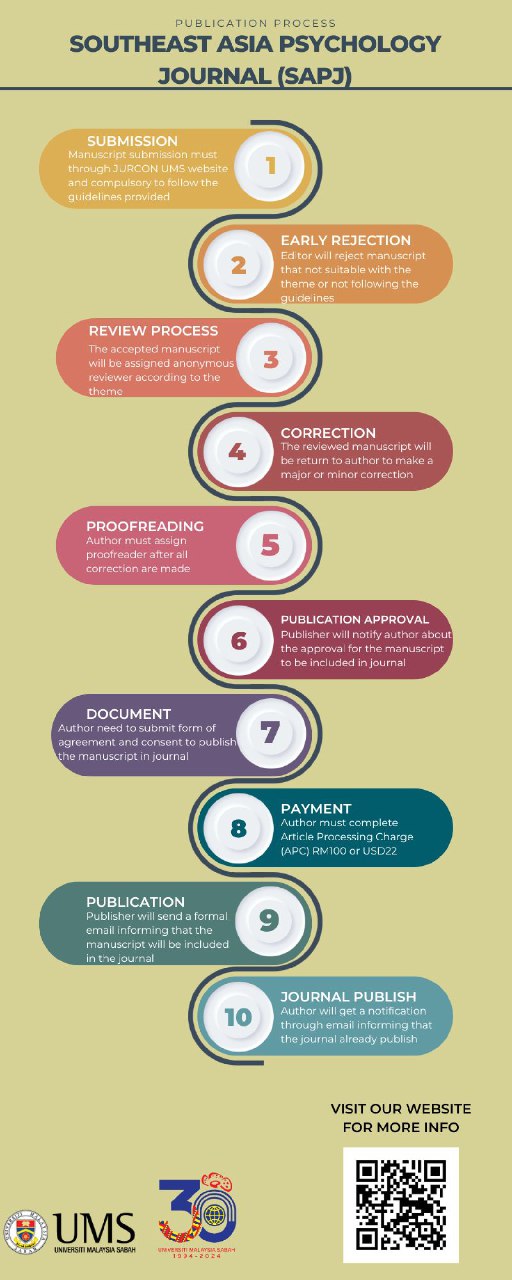PENILAIAN PSIKOMETRIK INSTRUMEN KESEJAHTERAAN PSIKOLOGI RYFF (PWBS) DALAM KALANGAN BELIA MALAYSIA
DOI:
https://doi.org/10.51200/sapj.v12i2.4836Keywords:
Psikometrik, Ujian dan pengukuran, kesejahteraan psikologi, beliaAbstract
Abstrak : Instrumen Ryff Psychological well being scale (PWBS) yang di rekabentuk oleh Ryff (1989) adalah antara instrumen yang sering digunakan untuk mengukur kesejahteraan psikologi khususnya dalam kalangan pelajar sekolah dan penuntut di pengajian tinggi. Namun yang demikian,penilaian psikometrik instrumen kajian ini hanya menjadi perhatian segelintir negara Asia . Instrumen Ryff Psychological well being versi pendek mengandungi 18 item soal selidik yang menjurus kepada soalan berkaitan kesejahteraan psikologi individu seperti matlamat hidup, perkembangan kendiri, autonomi,penguasaan persekitaran dan hubungan dengan orang lain. Ringkasnya, kajian ini bertujuan untuk mengenalpasti kebolehpercayaan dan kesahan instrumen kesejahteraan psikologi Ryff (PWBS) 18 item dalam kalangan belia Malaysia. Kajian ini merupakan kajian kuantitatif yang melibatkan pengumpulan data daripada soal selidik dalam kalangan belia berumur 18-25 tahun di Tawau. Hanya 100 orang responden diperlukan dalam kajian ini. Pengkaji menggunakan analisis kebolehpercayaan Cronbach Alpha. Sementara itu, kesahan interkorelasi digunakan untuk menguji kesahan konstruk soal selidik. Hasil analisis menunjukkan kebolehpercayaan tinggi bagi keseluruhan item iaitu 0.70. Bagi ujian kesahan konstruk, subskala hubungan dan tujuan hidup dilihat kurang mempunyai interkorelasi dengan subskala lain. Nilai korelasi hubungan dengan autonomi (0.15) manakala hubungan dengan penguasaan (0.86) . Seterusnya, bagi nilai interkorelasi tujuan hidup dengan penguasaan adalah (0.51) serta tujuan dengan penerimaan kendiri adalah (0.28). Penialaian psikometrik instrumen PWBS dilihat penting agar dapat dijadikan rujukan dalam kajian kesejahteraan psikologi belia dalam konteks Malaysia pada masa akan datang.
Kata Kunci : Psikometrik,ujian dan pengukuran,kesejahteraan psikologi, belia.
References
Amalia, S. (2016). Analisa psikometrik alat ukur Ryff’s Psychological Well-Being (RPWB) versi bahasa Indonesia: Studi pada lansia guna mengukur kesejahteraan dan kebahagiaan. In Seminar Asean 2nd Psychology & Humanity, 430-437. https://pustaka.unpad.ac.id/wp-content/uploads/2015/07/Analisa-Psikometrik-Alat-Ukur-RyffS-Psychological-Well-being.pdf
Babbie, E. (1992). The practice of social research. Carlifornia: Wadsworth
Cheng,.S.T & Chan,.A.C.M (2005). Measuring psychological well being in the Chinese.Personality and Individual Differences, 1307-1316. https://doi.org/10.1016/j.paid.2004.08.013
Cheng,.S.T,Chan,.T.W.S, Li.H.K (2014) . Childlessness and Subjective Well-being in Chinese Widowed Persons, The Journals of Gerontology, 48–52. https://doi.org/10.1093/geronb/gbt049
Creswell,J. W. (2005). Educational research: Planning, conducting and evaluating quantitative and qualitative research. Upper Saddle River, NJ: Merrill Apprentice Hall. http://repository.unmas.ac.id/medias/journal/EBK-00121.pdf
Cooper,D.R & Schindler,P.S. (2011). Business research methods (11th ed). New York: McGraw-Hill/Irwin.
Curtis,A.C (2015). Defining Adolescene. Journal Of Adolescents and Family Health,1-38. https://scholar.utc.edu/cgi/viewcontent.cgi?article=1035&context=jafh
Fernandes, H. M., Vasconcelos-Raposo, J., & Teixeira, C. M (2010). Preliminary analysis of the psychometric properties of Ryff's scales of psychological well-being in Portuguese adolescents. The Spanish journal of psychology,1032–1043. https://doi.org/10.1017/s1138741600002675
Ibrahim, N., Mohd Safien, A., Siau, C. S., & Shahar, S. (2020). The Effectiveness of a Depression Literacy Program on Stigma and Mental Help-Seeking Among Adolescents in Malaysia: A Control Group Study With 3-Month Follow-Up. Inquiry : a journal of medical care organization, provision and financing,1-10 . https://doi.org/10.1177/0046958020902332.
In J. (2017). Introduction of a pilot study. Korean journal of anesthesiology, 70(6), 601–605. https://doi.org/10.4097/kjae.2017.70.6.601
Irfan, M., Shahudin, F., Hooper, V. J., Akram, W., & Abdul Ghani, R. B. (2021). The Psychological Impact of Coronavirus on University Students and its Socio-economic determinants in Malaysia. The journal of healthcare organization, provision and financing, 1-7. https://doi.org/10.1177/00469580211056217
Kafka, G.J., Kozma, A. (2002) The Construct Validity of Ryff's Scales of Psychological Well-Being (SPWB) and their Relationship to Measures of Subjective Well-Being. Social Indicators Research, 171–190. https://doi.org/10.1023/A:1014451725204
Keyes, C. L. M., Shmotkin, D., & Ryff, C. D. (2002). Optimizing well-being: The empirical encounter of two traditions. Journal of Personality and Social Psychology, 82(6), 1007–1022. https://doi.org/10.1037/0022-3514.82.6.1007
Khanjani, M., Shahidi, S., Fathabadi, J., Mazaheri, M. A., & Shokri, O. (2014). Factor structure and psychometric properties of the Ryff’s scale of Psychological well-being, short form (18-item) among male and female students. Thoughts and Behavior in Clinical Psychology, 27-36. https://jtbcp.roudehen.iau.ir/article_67.html
Lee,.T.S , Sun,.H.F & Chiang,H.H. Development and validation of the short form Ryff’s psychological well being scale for clinical nurses inTaiwan. J Med Sci, 157-162.http://dx.doi.org/10.4103/jmedsci.jmedsci_191_18
Marina, I. M., & Jamil, A. (2013). Kesahan Dan Kebolehpercayaan Instrumen Penilaian Pelaksanaan Pentaksiran Kompetensi Persijilan Modular (PKPM). Paper presented at the Proceeding of the International Conference on Social Science Research, ICSSR 2013.https://www.researchgate.net/publication/283620846_ICSSR_2013_e-ISBN_978-967-11768-1-8
McLellan, R., Galton, M., Steward, S., & Page, C. (2012). The Impact of Creative Partnerships on the Wellbeing of Children and Young People. Newcastle: CCE. https://www.creativitycultureeducation.org/publication/the-impact-of-creative-partnerships-on-the-wellbeing-of-children-and-young-people/
Nen, S., Ibrahim, F., Selamat, M. N., Subhi, N., Sarnon, N., Ahsari, A. H., & Rahman, S. N. S. dan Z. A. (2021). School Engagement Among Adolescents from Low Income Family in Kuala Lumpur. International Journal of Academic Research in Business and Social Sciences, 936–945. http://dx.doi.org/10.6007/IJARBSS/v11-i6/10224
Panahi,.S , Yunus.A.S ,Roslan,S & Abdul Kadir.R (2016). Predictors of Psychological Well being among Malaysian Graduates. The European Journal Of Social Behavioral & Science, 2068-2083. http://dx.doi.org/10.15405/ejsbs.186
Pels,.F, Pels,.S.A & and Mack,.B.V.H.(2023). Measuring students’ Coping With the Brief COPE: An Investigation Testing Different Factor Structures across Two Contexts of University Education. Tuning Journal for Higher Education , 31-68. https://doi.org/10.18543/tjhe.2251
Puteh,.A.(2001).Perkembangan dan pembentukan remaja menurut islam.Kajian Malaysia,79101.http://web.usm.my/km/KM%20XIX,22001/PERKEMBANGAN%20DAN%20PEMBENTUKAN%20%20REMAJA%20MENURUT%20PERSPEKTIF%20ISLAM.
Ryff, C. D. (1989). Happiness is everything, or is it? Explorations on the meaning of psychological well-being. Journal of Personality and Social Psychology,1069–1081. https://doi.org/10.1037/0022-3514.57.6.1069
Seifert,.T (2015).The Ryff Scale of psychological well being. Center of Inquiry. Retrieved https://centerofinquiry.org/uncategorized/ryff-scales-of-psychological-well-being/
Sanu,M.E & Rathakrishnan,B. (2019). Strategi daya tindak sebagai mediator dalam hubungan kecerdasan emosi dan kesejahteraan psikologi pelajar miskin di luar bandar Sabah. Journal of Advanced Research in Social and Behavioural Sciences, 9-15.https://www.akademiabaru.com/doc/ARSBSV14_N1_P9_15.pdf
Sanu, M.E & Rathakrishnan, B. (2018).Pengaruh strategi daya tindak terhadap kesejahteraan psikologi pelajar miskin luar bandar Sabah. Malaysian Journal of Youth Studies, 1-18. https://iyres.gov.my/images/MJYS/2018/MJYS%20Vol%2019%20Dec%202018-5-21.pdf
Tee, E. Y. J., Shah, R. I, Ramis, T., & Jia-Qi, L. C. (2022). Bent, But Not Broken: Locus-of-Hope and Well-Being Among Malaysians Facing Economic Challenges Amidst the COVID-19 Pandemic. Psychological studies, 304–316. https://doi.org/10.1007/s12646-022-00653-y
Van Dierendonck, D., Díaz, D., Rodríguez-Carvajal, R. et al (2008). Ryff’s Six-factor Model of Psychological Well-being, A Spanish Exploration. Soc Indic Res , 473–479. https://doi.org/10.1007/s11205-007-9174-7
Zailani, D. H., Sultan Ibrahim, S. A., & Wahab, R. (2022). Psychological distress among the B40 population in Selangor. Healthscope: 32-36. http://healthscopefsk.com/index.php/research/article/view/291








